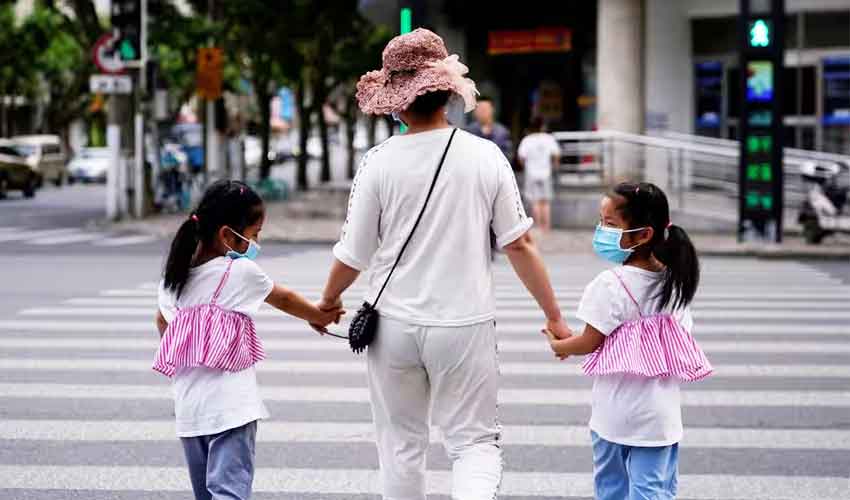In 2023, China's population declined for a second year in a row due to a record low birth rate and a wave of COVID-19 deaths that coincided with the lifting of strict lockdowns. These factors will have a significant long-term impact on the country's prospects for economic growth.
According to the National Bureau of Statistics, China's population fell by 2.08 million, or 0.15%, to 1.409 billion in 2023.
That was significantly more than the 850,000 population decline in 2022—the first since 1961, during the Great Famine of the Mao Zedong regime.
After three years of strict screening and quarantine measures that kept the virus mostly controlled until authorities abruptly relaxed limitations in December 2022, China saw a massive countrywide COVID surge early last year.
With 11.1 million fatalities overall last year, a 6.6% increase in the death rate brought the death rate to its highest point since the Cultural Revolution in 1974. Moreover, 9.02 million babies were born, a 5.7% decrease from 2022. The birth rate also dropped to a historic low of 6.39 per 1,000 inhabitants.
Due to the country's growing urbanization during the 1980–2015 one-child policy and its implementation, birth rates have been falling for decades. Similar to previous economic booms in South Korea and Japan, China saw a large-scale population shift from rural fields to cities, where raising a family is more expensive.
In 2022, South Korea had a birth rate of 4.9 per 1,000 people, while Japan had 6.3 per 1,000.
In 2023, China's desire to have more children was further stifled as youth unemployment reached all-time highs, earnings for many white-collar workers declined, and a crisis in the property sector—where more than two-thirds of household wealth is held—grew worse.
The new data confirms worries that the growth prospects of the second-largest economy in the world are deteriorating as a result of a decline in workers and customers, and that indebted local governments are being further burdened by the mounting expenses of retirement pensions and senior care.
According to UN estimates, India overtook China as the world's most populated country last year. This has sparked more discussion about the benefits of shifting some China-based supply chains to other markets, particularly as geopolitical tensions between Beijing and Washington mount.
Long-term U.N. forecasters predict that China's population would fall by 109 million by 2050, which is more than three times smaller than their previous estimate from 2019.
China's population over 60 increased from 280.04 million in 2022 to 296.97 million in 2023, or roughly 21.1% of the country's overall population.
China had a higher death rate in 2023 (7.87 deaths per 1,000 inhabitants) than in 2022 (7.37 fatalities).
The number of persons in the nation who are 60 years of age or older and in retirement is predicted to rise from roughly 280 million to more than 400 million by 2035, which is higher than the population of the United States as a whole.
The Chinese Academy of Sciences, a government agency, projects that the pension system would run out of money by 2035.
Zhu Guoping, a 57-year-old farmer in Gansu province's northwest, claimed that his family had little savings due to his meager 20,000 yuan ($2,779.59) annual salary.
When he reaches sixty, he will be entitled to a pension of 160 yuan per month, or $22.
Zhu declared, "The money is definitely not enough." "Maybe our children can provide us with some support in the future."
Many Chinese couples decide against having children due to the high expenditures of childcare and schooling, while women are discouraged from taking career pauses due to job market uncertainties.
Demographers claim that traditional assumptions that women take on the caregiving role in the family and gender discrimination make the problem worse.
Women should share "good family tradition stories," according to President Xi Jinping, who also stated that in order to "actively cultivate a new culture of marriage and childbearing," which he related to national growth, this must be done.
In an effort to promote childbirth, local governments have launched a number of initiatives, such as lengthier maternity leaves, tax discounts, and housing assistance.
However, many of the programs have not been put into practice because of a lack of financing and local governments' lack of desire, according to a Beijing policy center, which instead calls for a single national family subsidy program.
Wang Weidong, a 36-year-old employee at an internet company in Beijing, stated that he and his spouse were hesitant to have a second child.
Because of these incentives, some people won't become parents. The incentives do not constitute the primary cause. Thus, I believe it will be more difficult to stop this trend," Wang stated.



























